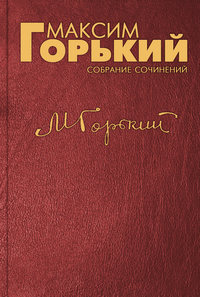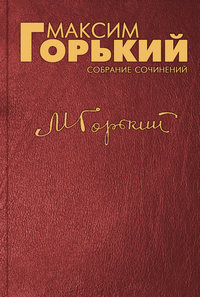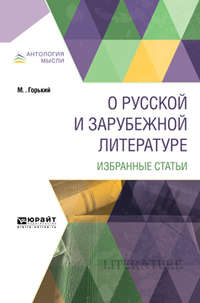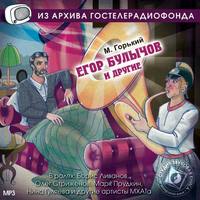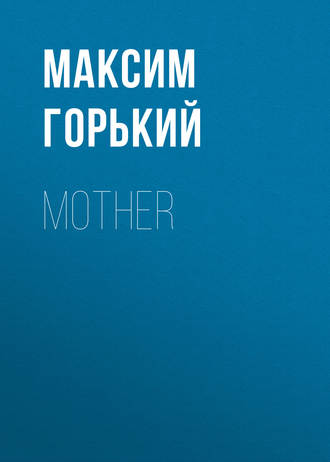 полная версия
полная версияMother
The mother sat down and looked around. One would have supposed that some powerful man in a stupid fit of insolence had knocked the walls of the house from the outside until everything inside had been jolted down. The portraits were scattered on the floor; the wall paper was torn away and stuck out in tufts; a board was pulled out of the flooring; a window sill was ripped away; the floor by the oven was strewn with ashes. The mother shook her head at the sight of this familiar picture.
"They wanted to show that they don't get money for nothing," remarked Nikolay.
On the table stood a cold samovar, unwashed dishes, sausages, and cheese on paper, along with plates, crumbs of bread, books, and coals from the samovar. The mother smiled. Nikolay also laughed in embarrassment, following the look of her eyes.
"It was I who didn't waste time in completing the picture of the upset. But never mind, Nilovna, never mind! I think they're going to come again. That's the reason I didn't pick it all up. Well, how was your trip?"
The mother started at the question. Rybin arose before her; she felt guilty at not having told of him immediately. Bending over a chair, she moved up to Nikolay and began her narrative. She tried to preserve her calm in order not to omit something as a result of excitement.
"They caught him!"
A quiver shot across Nikolay's face.
"They did? How?"
The mother stopped his questions with a gesture of her hand, and continued as if she were sitting before the very face of justice and bringing in a complaint regarding the torture of a man. Nikolay threw himself back in his chair, grew pale, and listened, biting his lips. He slowly removed his glasses, put them on the table, and ran his hand over his face as if wiping away invisible cobwebs. The mother had never seen him wear so austere an expression.
When she concluded he arose, and for a minute paced the floor in silence, his fists thrust deep into his pockets. Conquering his agitation he looked almost calmly with a hard gleam in his eyes into the face of the mother, which was covered with silent tears.
"Nilovna, we mustn't waste time! Let us try, dear comrade, to take ourselves in hand." Then he remarked through his teeth:
"He must be a remarkable fellow – such nobility! It'll be hard for him in prison. Men like him feel unhappy there." Stepping in front of the mother he exclaimed in a ringing voice: "Of course, all the commissioners and sergeants are nothings. They are sticks in the hands of a clever villain, a trainer of animals. But I would kill an animal for allowing itself to be turned into a brute!" He restrained his excitement, which, however, made itself felt to the mother's perceptions. Again he strode through the room, and spoke in wrath: "See what horror! A gang of stupid people, protesting their pernicious power over the people, beat, stifle, oppress everybody. Savagery grows apace; cruelty becomes the law of life. A whole nation is depraved. Think of it! One part beats and turns brute; from immunity to punishment, sickens itself with a voluptuous greed of torture – that disgusting disease of slaves licensed to display all the power of slavish feelings and cattle habits. Others are poisoned with the desire for vengeance. Still others, beaten down to stupidity, become dumb and blind. They deprave the nation, the whole nation!" He stopped, leaning his elbows against the doorpost. He clasped his head in both hands, and was silent, his teeth set.
"You involuntarily turn a beast yourself in this beastly life!"
Smiling sadly, he walked up to her, and bending over her asked, pressing her hand: "Where is your valise?"
"In the kitchen."
"A spy is standing at our gate. We won't be able to get such a big mass of papers out of the way unnoticed. There's no place to hide them in and I think they'll come again to-night. I don't want you to be arrested. So, however sorry we may be for the lost labor, let's burn the papers."
"What?"
"Everything in the valise!"
She finally understood; and though sad, her pride in her success brought a complacent smile to her face.
"There's nothing in it – no leaflets." With gradually increasing animation she told how she had placed them in the hands of sympathetic peasants after Rybin's departure. Nikolay listened, at first with an uneasy frown, then in surprise, and finally exclaimed, interrupting her story:
"Say, that's capital! Nilovna, do you know – " He stammered, embarrassed, and pressing her hand, exclaimed quietly: "You touch me so by your faith in people, by your faith in the cause of their emancipation! You have such a good soul! I simply love you as I didn't love my own mother!"
Embracing his neck, she burst into happy sobs, and pressed his head to her lips.
"Maybe," he muttered, agitated and embarrassed by the newness of his feeling, "maybe I'm speaking nonsense; but, upon my honest word, you are a beautiful person, Nilovna – yes!"
"My darling, I love you, too; and I love you all with my whole soul, every drop of my blood!" she said, choking with a wave of hot joy.
The two voices blended into one throbbing speech, subdued and pulsating with the great feeling that was seizing the people.
"Such a large, soft power is in you; it draws the heart toward you imperceptibly. How brightly you describe people! How well you see them!"
"I see your life; I understand it, my dear!"
"One loves you. And it's such a marvelous thing to love a person – it's so good, you know!"
"It is you, you who raise the people from the dead to life again; you!" the mother whispered hotly, stroking his head. "My dear, I think I see there's much work for you, much patience needed. Your power must not be wasted. It's so necessary for life. Listen to what else happened: there was a woman there, the wife of that man – "
Nikolay sat near her, his happy face bent aside in embarrassment, and stroked his hair. But soon he turned around again, and looking at the mother, listened greedily to her simple and clear story.
"A miracle! Every possibility of your getting into prison and suddenly – Yes, it's evident that the peasants, too, are beginning to stir. After all, it's natural. We ought to get special people for the villages. People! We haven't enough – nowhere. Life demands hundreds of hands!"
"Now, if Pasha could be free – and Andriusha," said the mother softly. Nikolay looked at her and drooped his head.
"You see, Nilovna, it'll be hard for you to hear; but I'll say it, anyway – I know Pavel well; he won't leave prison. He wants to be tried; he wants to rise in all his height. He won't give up a trial, and he needn't either. He will escape from Siberia."
The mother sighed and answered softly:
"Well, he knows what's best for the cause."
Nikolay quickly jumped to his feet, suddenly seized with joy again.
"Thank you, Nilovna! I've just lived through a magnificent moment – maybe the best moment of my life. Thank you! Now, come, let's give each other a good, strong kiss!"
They embraced, looking into each other's eyes. And they gave each other firm, comradely kisses.
"That's good!" he said softly.
The mother unclasped her hands from about his neck and laughed quietly and happily.
"Um!" said Nikolay the next minute. "If your peasant there would hurry up and come here! You see, we must be sure to write a leaflet about Rybin for the village. It won't hurt him once he's come out so boldly, and it will help the cause. I'll surely do it to-day. Liudmila will print it quickly. But then arises the question – how will it get to the village?"
"I'll take it!"
"No, thank you!" Nikolay exclaimed quietly. "I'm wondering whether Vyesovshchikov won't do for it. Shall I speak to him?"
"Yes; suppose you try and instruct him."
"What'll I do then?"
"Don't worry!"
Nikolay sat down to write, while the mother put the table in order, from time to time casting a look at him. She saw how his pen trembled in his hand. It traveled along the paper in straight lines. Sometimes the skin on his neck quivered; he threw back his head and shut his eyes. All this moved her.
"Execute them!" she muttered under her breath. "Don't pity the villains!"
"There! It's ready!" he said, rising. "Hide the paper somewhere on your body. But know that when the gendarmes come they'll search you, too!"
"The dogs take them!" she answered calmly.
In the evening Dr. Ivan Danilovich came.
"What's gotten into the authorities all of a sudden?" he said, running about the room. "There were seven searches last night. Where's the patient?"
"He left yesterday. To-day, you see, Saturday, he reads to working people. He couldn't bring it over himself to omit the reading."
"That's stupid – to sit at readings with a fractured skull!"
"I tried to prove it to him, but unsuccessfully."
"He wanted to do a bit of boasting before the comrades," observed the mother. "Look! I've already shed my blood!"
The physician looked at her, made a fierce face, and said with set teeth:
"Ugh! ugh! you bloodthirsty person!"
"Well, Ivan, you've nothing to do here, and we're expecting guests. Go away! Nilovna, give him the paper."
"Another paper?"
"There, take it and give it to the printer."
"I've taken it; I'll deliver it. Is that all?"
"That's all. There's a spy at the gate."
"I noticed. At my door, too. Good-by! Good-by, you fierce woman! And do you know, friends, a squabble in a cemetery is a fine thing after all! The whole city's talking about it. It stirs the people up and compels them to think. Your article on that subject was excellent, and it came in time. I always said that a good fight is better than a bad peace."
"All right. Go away now!"
"You're polite! Let's shake hands, Nilovna. And that fellow – he certainly behaved stupidly. Do you know where he lives?"
Nikolay gave him the address.
"I must go to him to-morrow. He's a fine fellow, eh?"
"Very!"
"We must keep him alive; he has good brains. It's from just such fellows that the real proletarian intellectuals ought to grow up – men to take our places when we leave for the region where evidently there are no class antagonisms. But, after all, who knows?"
"You've taken to chattering, Ivan."
"I feel happy, that's why. Well, I'm going! So you're expecting prison? I hope you get a good rest there!"
"Thank you, I'm not tired!"
The mother listened to their conversation. Their solicitude in regard to the workingmen was pleasant to her; and, as always, the calm activity of these people which did not forsake them even before the gates of the prison, astonished her.
After the physician left, Nikolay and the mother conversed quietly while awaiting their evening visitors. Then Nikolay told her at length of his comrades living in exile; of those who had already escaped and continued their work under assumed names. The bare walls of the room echoed the low sounds of his voice, as if listening in incredulous amazement to the stories of modest heroes who disinterestedly devoted all their powers to the great cause of liberty.
A shadow kindly enveloped the woman, warming her heart with love for the unseen people, who in her imagination united into one huge person, full of inexhaustible, manly force. This giant slowly but incessantly strides over the earth, cleansing it, laying bare before the eyes of the people the simple and clear truth of life – the great truth that raises humanity from the dead, welcomes all equally, and promises all alike freedom from greed, from wickedness, and falsehood, the three monsters which enslaved and intimidated the whole world. The image evoked in the mother's soul a feeling similar to that with which she used to stand before an ikon. After she had offered her joyful, grateful prayer, the day had then seemed lighter than the other days of her life. Now she forgot those days. But the feeling left by them had broadened, had become brighter and better, had grown more deeply into her soul. It was more keenly alive and burned more luminously.
"But the gendarmes aren't coming!" Nikolay exclaimed suddenly, interrupting his story.
The mother looked at him, and after a pause answered in vexation:
"Oh, well, let them go to the dogs!"
"Of course! But it's time for you to go to bed, Nilovna. You must be desperately tired. You're wonderfully strong, I must say. So much commotion and disturbance, and you live through it all so lightly. Only your hair is turning gray very quickly. Now go and rest."
They pressed each other's hand and parted.
CHAPTER XIII
The mother fell quickly into a calm sleep, and rose early in the morning, awakened by a subdued tap at the kitchen door. The knock was incessant and patiently persistent. It was still dark and quiet, and the rapping broke in alarmingly on the stillness. Dressing herself rapidly, she walked out into the kitchen, and standing at the door asked:
"Who's there?"
"I," answered an unfamiliar voice.
"Who?"
"Open." The quiet word was spoken in entreaty.
The mother lifted the hook, pushed the door with her foot, and Ignaty entered, saying cheerfully:
"Well, so I'm not mistaken. I'm at the right place."
He was spattered with mud up to his belt. His face was gray, his eyes fallen.
"We've gotten into trouble in our place," he whispered, locking the door behind him.
"I know it."
The reply astonished the young man. He blinked and asked:
"How? Where from?"
She explained in a few rapid words, and asked:
"Did they take the other comrades, too?"
"They weren't there. They had gone off to be recruited. Five were captured, including Rybin."
He snuffled and said, smiling:
"And I was left over. I guess they're looking for me. Let them look. I'm not going back there again, not for anything. There are other people there yet, some seven young men and a girl. Never mind! They're all reliable."
"How did you find this place?" The mother smiled.
The door from the room opened quietly.
"I?" Seating himself on a bench and looking around, Ignaty exclaimed: "They crawled up at night, straight to the tar works. Well, a minute before they came the forester ran up to us and knocked on the window. 'Look out, boys,' says he, 'they're coming on you.'"
He laughed softly, wiped his face with the flap of his coat, and continued:
"Well, they can't stun Uncle Mikhaïl even with a hammer. At once he says to me, 'Ignaty, run away to the city, quick! You remember the elderly woman.' And he himself writes a note. 'There, go! Good-by, brother.' He pushed me in the back. I flung out of the hut. I scrambled along on all fours through the bushes, and I hear them coming. There must have been a lot of them. You could hear the rustling on all sides, the devils – like a moose around the tar works. I lay in the bushes. They passed by me. Then I rose and off I went; and for two nights and a whole day I walked without stopping. My feet'll ache for a week."
He was evidently satisfied with himself. A smile shone in his hazel eyes. His full red lips quivered.
"I'll set you up with some tea soon. You wash yourself while I get the samovar ready."
"I'll give you the note." He raised his leg with difficulty, and frowning and groaning put his foot on the bench and began to untie the leg wrappings.
"I got frightened. 'Well,' thinks I, 'I'm a goner.'"
Nikolay appeared at the door. Ignaty in embarrassment dropped his foot to the floor and wanted to rise, but staggered and fell heavily on the bench, catching himself with his hands.
"You sit still!" exclaimed the mother.
"How do you do, comrade?" said Nikolay, screwing up his eyes good-naturedly and nodding his head. "Allow me, I'll help you."
Kneeling on the floor in front of the peasant, he quickly unwound the dirty, damp wrappings.
"Well!" the fellow exclaimed quietly, pulling back his foot and blinking in astonishment. He regarded the mother, who said, without paying attention to his look:
"His legs ought to be rubbed down with alcohol."
"Of course!" said Nikolay.
Ignaty snorted in embarrassment. Nikolay found the note, straightened it out, looked at it, and handed the gray, crumpled piece of paper to the mother.
"For you."
"Read it."
"'Mother, don't let the affair go without your attention. Tell the tall lady not to forget to have them write more for our cause, I beg of you. Good-by. Rybin.'"
"My darling!" said the mother sadly. "They've already seized him by the throat, and he – "
Nikolay slowly dropped his hand holding the note.
"That's magnificent!" he said slowly and respectfully. "It both touches and teaches."
Ignaty looked at them, and quietly shook his bared feet with his dirty hands. The mother, covering her tearful face, walked up to him with a basin of water, sat down on the floor, and stretched out her hands to his feet. But he quickly thrust them under the bench, exclaiming in fright:
"What are you going to do?"
"Give me your foot, quick!"
"I'll bring the alcohol at once," said Nikolay.
The young man shoved his foot still farther under the bench and mumbled:
"What are you going to do? It's not proper."
Then the mother silently unbared his other foot. Ignaty's round face lengthened in amazement. He looked around helplessly with his wide-open eyes.
"Why, it's going to tickle me!"
"You'll be able to bear it," answered the mother, beginning to wash his feet.
Ignaty snorted aloud, and moving his neck awkwardly looked down at her, comically drooping his under lip.
"And do you know," she said tremulously, "that they beat Mikhaïl Ivanovich?"
"What?" the peasant exclaimed in fright.
"Yes; he had been beaten when they led him to the village, and in Nikolsk the sergeant beat him, the police commissioner beat him in the face and kicked him till he bled." The mother became silent, overwhelmed by her recollections.
"They can do it," said the peasant, lowering his brows sullenly. His shoulders shook. "That is, I fear them like the devils. And the peasants – didn't the peasants beat him?"
"One beat him. The police commissioner ordered him to. All the others were so so – they even took his part. 'You mustn't beat him!' they said."
"Um! Yes, yes! The peasants are beginning to realize where a man stands, and for what he stands."
"There are sensible people there, too."
"Where can't you find sensible people? Necessity! They're everywhere; but it's hard to get at them. They hide themselves in chinks and crevices, and suck their hearts out each one for himself. Their resolution isn't strong enough to make them gather into a group."
Nikolay brought a bottle of alcohol, put coals in the samovar, and walked away silently. Ignaty accompanied him with a curious look.
"A gentleman?"
"In this business there are no masters; they're all comrades!"
"It's strange to me," said Ignaty with a skeptical but embarrassed smile.
"What's strange?"
"This: at one end they beat you in the face; at the other they wash your feet. Is there a middle of any kind?"
The door of the room was flung open and Nikolay, standing on the threshold, said:
"And in the middle stand the people who lick the hands of those who beat you in the face and suck the blood of those whose faces are beaten. That's the middle!"
Ignaty looked at him respectfully, and after a pause said: "That's it!"
The mother sighed. "Mikhaïl Ivanovich also always used to say, 'That's it!' like an ax blow."
"Nilovna, you're evidently tired. Permit me – I – "
The peasant pulled his feet uneasily.
"That'll do;" said the mother, rising. "Well, Ignaty, now wash yourself."
The young man arose, shifted his feet about, and stepped firmly on the floor.
"They seem like new feet. Thank you! Many, many thanks!"
He drew a wry face, his lips trembled, and his eyes reddened. After a pause, during which he regarded the basin of black water, he whispered softly:
"I don't even know how to thank you!"
Then they sat down to the table to drink tea. And Ignaty soberly began:
"I was the distributer of literature, a very strong fellow at walking. Uncle Mikhaïl gave me the job. 'Distribute!' says he; 'and if you get caught you're alone.'"
"Do many people read?" asked Nikolay.
"All who can. Even some of the rich read. Of course, they don't get it from us. They'd clap us right into chains if they did! They understand that this is a slipknot for them in all ages."
"Why a slipknot?"
"What else!" exclaimed Ignaty in amazement. "Why, the peasants are themselves going to take the land from everyone else. They'll wash it out with their blood from under the gentry and the rich; that is to say, they themselves are going to divide it, and divide it so that there won't be masters or workingmen anymore. How then? What's the use of getting into a scrap if not for that?"
Ignaty even seemed to be offended. He looked at Nikolay mistrustfully and skeptically. Nikolay smiled.
"Don't get angry," said the mother jokingly.
Nikolay thoughtfully exclaimed:
"How shall we get the leaflets about Rybin's arrest to the village?" Ignaty grew attentive.
"I'll speak to Vyesovshchikov to-day."
"Is there a leaflet already?" asked Ignaty.
"Yes."
"Give it to me. I'll take it." Ignaty rubbed his hands at the suggestion, his eyes flashing. "I know where and how. Let me."
The mother laughed quietly, without looking at him.
"Why, you're tired and afraid, and you said you'd never go there again!"
Ignaty smacked his lips and stroked his curly hair with his broad palm.
"I'm tired; I'll rest; and of course I'm afraid!" His manner was businesslike and calm. "They beat a man until the blood comes, as you yourself say – then who wants to be mutilated? But I'll pull through somehow at night. Never mind! Give me the leaflets; this evening I'll get on the go." He was silent, thought a while, his eyebrows working. "I'll go to the forest; I'll hide the literature, and then I'll notify our fellows: 'Go get it.' That's better. If I myself should distribute them I might fall into the hands of the police, and it would be a pity for the leaflets. You must act carefully here. There are not many such leaflets!"
"And how about your fear?" the mother observed again with a smile. This curly-haired, robust fellow put her into a good humor by his sincerity, which sounded in his every word, and shone from his round, determined face.
"Fear is fear, and business is business!" he answered with a grin. "Why are you laughing at me, eh? You, too! Why, isn't it natural to be afraid in this matter? Well, and if it's necessary a man'll go into a fire. Such an affair, it requires it."
"Ah, you, my child!"
Ignaty, embarrassed, smiled. "Well, there you are – child!" he said.
Nikolay began to speak, all the time looking good-naturedly with screwed-up eyes at the young peasant.
"You're not going there!"
"Then what'll I do? Where am I to be?" Ignaty asked uneasily.
"Another fellow will go in place of you. And you'll tell him in detail what to do and how to do it."
"All right!" said Ignaty. But his consent was not given at once, and then only reluctantly.
"And for you we'll obtain a good passport and make you a forester."
The young fellow quickly threw back his head and asked uneasily:
"But if the peasants come there for wood, or there – in general – what'll I do? Bind them? That doesn't suit me."
The mother laughed, and Nikolay, too. This again confused and vexed Ignaty.
"Don't be uneasy!" Nikolay soothed him. "You won't have to bind peasants. You trust us."
"Well, well," said Ignaty, set at ease, smiling at Nikolay with confidence and merriness in his eyes. "If you could get me to the factory. There, they say, the fellows are mighty smart."
A fire seemed to be ever burning in his broad chest, unsteady as yet, not confident in its own power. It flashed brightly in his eyes, forced out from within; but suddenly it would nearly expire in fright and flicker behind the smoke of perplexed alarm and embarrassment.
The mother rose from behind the table, and looking through the window reflected:
"Ah, life! Five times in the day you laugh and five times you weep. All right. Well, are you through, Ignaty? Go to bed and sleep."




